The Checker Maven
The World's Most Widely Read Checkers and Draughts Publication
Bob Newell, Editor-in-Chief
Published every Saturday morning in Honolulu, Hawai`i
Noticing missing images? An explanation is here.
Hurry Back to School

School is back in session, and the kids had better hurry and catch the bus so as not to be late--- we suppose we should say "tardy"--- for class. A little extra speed might avoid having to bring home a note from the teacher.
A little extra hustle is also called for in this month's speed problem, which looks more complex than it really is. Keen eyes and good checker sense will solve this one, but there's not a moment to lose, as we're only allowing 30 seconds to solve it.
Don't miss the bus; click on the link below, find the answer, and then ride back and click on Read More to check your moves.
September Speed Problem (moderate difficulty; 30 second time limit)
![]()
Uncle Ben's Porch: Making Varsity

Tommy had a very important match coming up. There was one spot left on the varsity checker team for the coming school year; Tommy, as Captain of the junior varsity, had a shot at it.
Coach Hovmiller tried to be fair about these things. He set up a series of test matches and promoted the players who had the best scores combined with the best attributes such as team play, sportsmanship, and so on. Tommy ranked well in all of the latter factors, but he was having a run of bad luck with the test matches.

It wasn't that Tommy was a poor player; he was one of the best. But he'd blundered in one game and had a loss of confidence, quickly losing two more. Coach Hovmiller knew that Tommy was better than that, but he wouldn't bend his own rules. Fair is fair, and Tommy had to win the next match to gain a varsity position.
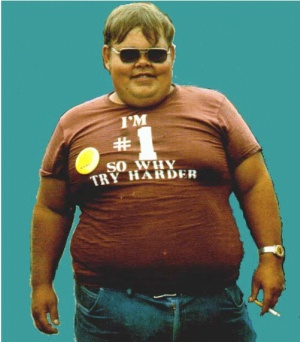
The trouble was, the match was with Joey Zee, and Joey was not a very nice boy (see previous Checker Maven column). Joey was almost dropped from the team by the Coach several times during the year for his bad behavior. He had no chance at a varsity position, but Tommy still had to play him to complete the round-robin competition, and Joey would like nothing better than to knock Tommy out of the running. Joey was always calling Tommy "goody two-shoes." Worse, Joey wouldn't leave teammate Tina Tooner alone, and Tommy and Tina had recently become friends in the way that a young boy and a young girl will do.
Joey was insanely jeaous, and Tommy had no idea what he might do. Joey was known to cheat when he could get away with it, and was the author of no end of dirty tricks and mean stunts.

Tommy was on Uncle Ben's porch, as was common most Saturday mornings. Uncle Ben, a retired master player, had some years ago taken Tommy under his wing and given him weekly lessons, always accompanied by a pitcher of his delicious lemonade. He wasn't really Tommy's uncle, of course, but Tommy called him that out of respect.
Tommy and Uncle Ben had developed a very close and open relationship. Tommy often sought the old gent's advice, and this was one of those times. He had just finished explaining to Uncle Ben his loss of self-confidence and his intimidation at having to play Joey Zee on Tuesday afternoon at after-school team practice.
"Everyone loses some games," Uncle Ben explained. "The old saying is that if you don't want to lose then don't play."
"I know, Uncle Ben, but I was doing so well ... "
"Tommy, a checker rating or a won and lost record only tells someone how well you've played in the past. It can't say for sure how well you'll play in the future. Do you know the difference between a great player and an average player?" Uncle Ben asked.
"Skill?" Tommy replied.
"Well, yes, of course, but there's something really fundamental. A great player learns from his losses, takes them in stride, and takes on the next game with confidence. A lesser player isn't able to do that. And Tommy, you're not a lesser player. You have the potential to possibly even rise to the professional ranks some day."
Uncle Ben wasn't liberal with compliments of this type; he didn't want his students to become overconfident or even arrogant. But this was the time to give Tommy's ego a little boost, and in any case, Uncle Ben knew that what he said was true, or he never would have said it.
"Really, Uncle Ben?"
"Yes, Tommy. Now, the problem you're having is that you're thinking too much about that varsity position, instead of thinking about each game and each move as it takes place. If you'll concentrate on trying to make the best move every time, and nothing else, you'll pull out of your slump before you can say 'Jack Robinson'."
"That makes sense, Uncle Ben. I'll do the best I can. But what about Joey? He's so mean and I don't know what he might do."
"Well, Tommy, you can't control that. But you don't have to let it get the better of you, either. Concentrate on playing your game. If Joey acts up, stop the clock and call for the Coach. Stop Joey dead in his tracks. And by all means remain a good sport yourself. Don't retaliate, don't do mean or foolish things yourself. Just play your game and make sure Joey knows that he can't bully you or get away with anything."
"Thanks, Uncle Ben," said Tommy. "That's great advice."

Uncle Ben was pouring lemonade and had turned to the checkerboard on the table in front of them. He passed a tall, frosty glass to Tommy and said, "Now try this one, and work on keeping your focus."
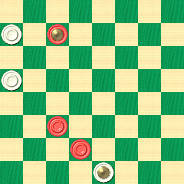
BLACK
Black to Play and Draw
B:B7,11,K27:W20,28,K2.
Tommy sat at the board for the full five minutes that Uncle Ben usually allowed him to solve a problem. "Here it is, Uncle Ben!" Tommy announced, and proceeded to demonstrate the solution.
Would you make the Varsity Team? Show the right stuff by solving the problem (lemonade is optional but highly recommended). When you're done, click on Read More to see the solution, a sample game, and a dozen more examples of this theme.![]()
An Historical Game

In today's entry in our Checker School series, drawn from Ben Boland's celebrated Famous Positions in the Game of Checkers, Mr. Boland is unusually laconic and we had to spend a few minutes divining the reason he titled the study below "An Historical Game." You'll understand it better after you try the problem and then view the solution and notes.
BLACK
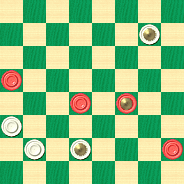
WHITE
Black Plays; White Draws
W:WK8,21,25,K26:B13,18,K19,28.
Forces are even (Black is about to get a second king), but in checkers we know that's only half the story. Black has superior mobility and that often means victory. It looks like White is going to have an historic struggle here just to pull out a draw.
Can you make personal history by solving the problem, or will you just be history? It's not something to become "historical" over; give it your best try and then click on Read More to see the solution and all the trimmings.![]()
Now You Dunne It

We think the poor fellow in the cartoon above is going to be in a lot of trouble in very short order. We only hope that he can somehow win the situation, but that's going to be quite a challenge.
Another kind of win that's a real challenge occurs in our game of checkers (although we'll bet it's easier than the situation depicted in the cartoon). It's known as Dunne's Win and it will be explained to us by Willie Ryan, as we quote from his classic Tricks Traps & Shots of the Checkerboard.
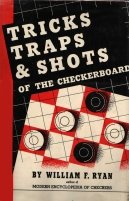
"Similar to the difficult George Dick Gambit, the ever practical Dunne's Win is a delicately balanced positional win that white is required to engineer by precise play.
Here's the run-up: 9-14, 22-17, 11-16, 25-22, 8-11, 22-18, 16-20, 18-9, 5-14, 29-25, 4-8---A, and we have the position depicted on the diagram, known as 'Dunne's Win.'
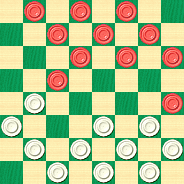
WHITE
White to Play and Win
W:W32,31,30,28,27,26,25,24,23,21,17:B20,14,12,11,10,8,7,6,3,2,1.
A---Black's position is hopeless after this move, with 22 pieces still on the board. The correct procedure is 11-15*, 25-22, 7-11*; now either 17-13 or 24-19 taxes black. For continuation, see Reisman's Pioneer Book, the leading authority on this formation."
Can you do this problem, or will you get Dunne on? When you Dunne done it, click on Read More to see the solution and notes.![]()
Fast Relief

At the time of writing, much of the United States mainland was suffering from unseasonable heat, and the hottest month of the year, August, still lays ahead. We can only hope that our mainland friends get some fast relief.
Fast relief is also the subject of this month's speed problem. As you'll see when you click on the link below, with correct play Black can win quickly and head off to a refreshing shower or a tall, cool beverage ... if the right moves are made. We rate this problem as "easy to medium" and we'll give you a generous 15 seconds to find the win and earn your reward. When you've solved it, come back here and click on Read More to check your solution.
August Speed Problem (easy to medium, 15 seconds)
![]()
Double Duty

Checker players can take an important lesson from working moms, who do double duty--- they are full-time employees as well as full-time mothers and homemakers. We often wonder how they have the mental and physical stamina to do it all.
You might think the point we're making is that, as checkerists, we can ourselves do "double duty" and fit checker study and play into our busy lives (admittedly, much less of a task than that faced by working moms). While a valid point, that's not where we're going in today's column. You'll get the idea when you solve the problem diagrammed below.
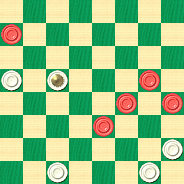
WHITE
White to Play and Win
W:W32,30,28,K14,13:B23,20,19,16,5.
Can you find the White win right away, or will you have to double back and try again? Make at least two attempts before you click on Read More (and that's a single click, not a double click) to see the solution.![]()
McCulloch's Masterpiece

There was a huge ranch recently for sale in McCulloch County, Texas. The sales literature called the 8,000 acre ranch a "masterpiece" and attached the same label to the property's 7500 square foot ranch home. Priced at just over 25 million dollars, we're reminded that this version of "McCulloch's Masterpiece" won't come cheap, though we have little doubt that it's worth every cent.
For better or worse, The Checker Maven doesn't have a budget that supports such high end investments; at times we have enough trouble just paying the bills. So today, we'll bring you a different "McCulloch's Masterpiece," one of the checker variety, and one that won't cost us--- or you--- anything at all. It's the latest entry in our Checker School series, and comes from Ben Boland's Famous Positions in the Game of Checkers.
WHITE
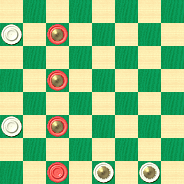
BLACK
Black to Play and Win
B:W28,12,K2,K1:BK27,K19,K11,3.
Don't bet the bank on this one, just enjoy solving it! When you've found the answer, click on Read More to cash in on the solution, three sample games, and detailed explanatory notes.![]()
Dick's Gambit

The photo above is of an iceboat named Dick's Gambit. It was taken by Michigan photographer Rick Wolanin, and is used with his kind permission. (You can see more of his work here.)
We can understand why the boat bears the "Gambit" moniker; ice-boating is a pretty wild and wooly endeavor. After all, a "gambit" is a deliberate risk taken in the hope of gaining something in return.
There are gambits in checkers, too; there is even "Dick's Gambit" although in this case we refer to checkerist George Dick. Willie Ryan featured Mr. Dick's gambit in Tricks Traps & Shots of the Checkerboard, and we're reprinting Willie's words for you today.

"As a general rule, an early losing move, when properly met, causes the game to deteriorate rapidly. The numerous early losses illustrated in this book prove that. However, there are some exceptions to this rule, as in the game below, where white makes a losing move on the eighth turn, yet is able to keep the game going for a long time, on the very fringe of tenability, only to succumb in the end to black's exacting play.
| 11-15 | 5-9 | 11-16 |
| 24-19 | 25-22---A | 18-15---E |
| 15-24 | 8-11 | 10-19 |
| 28-19 | 30-25---B, C | 22-17---F. |
| 9-14 | 12-16*---D | See the |
| 22-18 | 19-12 | diagram. |
A---A losing move---1. Although white is lost on the eighth play, with 22 pieces still on the board, this is one case where you can't count your checkers until they're hatched. The usual continuation for a draw at A is 26-22*, 8-11, 22-17, 11-16, 25-22, 16-20, 17-13, 4-8, 22-17, 8-11, 30-26, 11-15, 18-11, 7-16, 26-22, 2-7, 22-18, 7-11, 18-15, 11-18, 29-25, 3-8, 31-26, 8-11, 19-15, 10-19, 17-10, 6-15, 13-6, 1-10, 23-7, 15-18, 7-3, 19-23, 26-19, 16-23, 3-8, 11-16, 8-11, 16-19. James Hill.
B---If 22-17 is played at this point, black scores with: 9-13, 18-9, 13-22, 26-17, 6-22, 30-26, 11-15, 26-17, 15-24, 27-20, 10-15, 29-25, 15-19, 23-16, 12-19, 31-26, 4-8, 25-22, 8-11, etc. John Drummond.
C---If 27-24 is played, the win is clinched by black with: 11-16, 24-20, 3-8, 20-11, 8-24, 32-28, 4-8, 28-19, 8-11, 30-25, 1-5, 22-17, 9-13, 18-9, 5-14*, 25-22, 11-15, 19-16, 12-19, 23-16, 7-11, 16-7, 2-11, 26-23, 11-16. Wm. F. Ryan.
D---The only move to force the win, which proves that sometimes you must give a man to get a game.
E---Absolutely necessary, as black is threatening to win with 16-19.
F---Again forced, as 22-18 is suicide if black moves 16-20 in reply; while 32-28, 4-8, 22-17, 7-10, reverts to Note H."
1---A very long computer analysis says that this move is clearly inferior, but it's hard to interpret it as a dead loss at this point. It's interesting to watch the computer, as the analysis runs deeper and deeper, slowly increase its evaluation of Black's advantage, but after over half an hour, it still doesn't see a definite win---Ed.
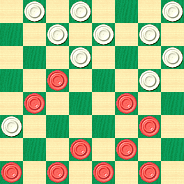
BLACK
Black fo Play and Win
B:W32,31,29,27,26,25,23,21,17,12:B19,16,14,9,7,6,4,3,2,1.
Solving this problem won't require a gambit on your part, or even a slippery ice-boat ride; all that's needed is substantive checker skill. Give it a try and then slide your mouse to Read More to see the solution.![]()
All But One
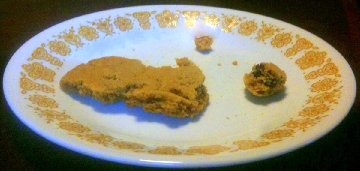
It's the sort of thing we did when we were kids. We'd find a plate of cookies on the kitchen table, and we'd eat all but one, thinking that if we left that one cookie behind, no one would think that we had eaten the rest. Somehow, it never seemed to work, but that didn't stop us from trying ... and those cookies were so good!
We've titled today's stroke problem "All But One" and you'll know why we chose that title when you find the solution.
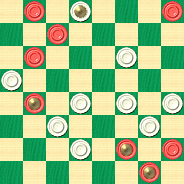
WHITE
White to Play and Win
W:W26,24,22,20,19,18,13,11,K2:BK32,28,K27,K17,9,6,4,1.
Can you solve this one or will you get caught with your hand in the cookie jar? It's an elegant composition and the solution is a treat ... perhaps even as good as those cookies we purloined all those many years ago. When you've eaten this problem up, click on Read More to see the solution.![]()
![]()
A Grand Rapids 4th

Once again, we take the annual opportunity to remark that as unabashed and unapologetic patriots we greatly enjoy celebrating the 4th of July holiday. For us, that celebration always includes the publication of a fine checker problem by an American composer.
A little while back, we discovered the astonishing work of late 19th century checkerist O. H. Richmond, of Grand Rapids, Michigan (an all-American town if there ever was one, as the photo above illustrates). Today we're pleased to present another of Mr. Richmond's fine problems with the hope that you will enjoy it as much as we did.
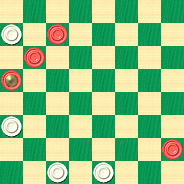
WHITE
White to Play and Win
W:W5,21,30,31:B6,9,K13,28.
Join us in including checkers in your 4th of July festivities. Solve the problem, and then click on Read More to see the solution.![]()
The Checker Maven is produced at editorial offices in Honolulu, Hawai`i, as a completely non-commercial public service from which no profit is obtained or sought. Original material is Copyright © 2004-2025 Avi Gobbler Publishing. Other material is public domain, as attributed, or licensed under Creative Commons. Information presented on this site is offered as-is, at no cost, and bears no express or implied warranty as to accuracy or usability. You agree that you use such information entirely at your own risk. No liabilities of any kind under any legal theory whatsoever are accepted. The Checker Maven is dedicated to the memory of Mr. Bob Newell, Sr.

